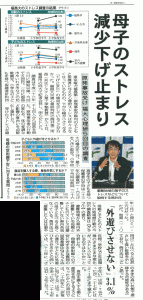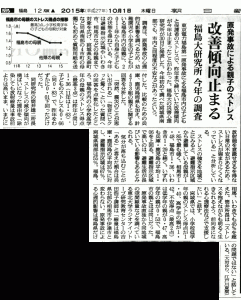Original Japanese written by staffer
The English below translated from the original Japanese by Heeday
The English translation edited by Rev. Dr. Henry French, ELCA
(Source: articles of October 1st, 2015 editions of the Fukushima Minpo and Asahi Shimbun newspapers)
▼Click each image to enlarge it and read the caption.
The level of stress experienced by children and their parents living in Fukushima Prefecture as refugees from the vicinity of TEPCO’s Fukushima Daiichi Nuclear Power Plant (NPP), which experienced a disaster, kept diminishing until last year. A survey by the Center for Psychological Studies of Disaster, Fukushima University, however, discovered that the reduction in stress among refugees stopped this year. The survey results were published on September 30th.
The Center’s Director, Yuji Tsutsui, a professor of symbiotic systems science, analyzes this leveling off of the reduction in stress levels and describes the cause, saying, “After all the decontamination work, the radiation level remains higher than it was before the meltdown. Those refugees are still living every day with the fear of radiation. Thus, their stress level does not come down anymore. Their stress level might remain as it is for years to come.”
The survey results also show that those mothers and children living as refugees in or out of Fukushima Prefecture suffer from higher levels of stress than those living in the same prefecture, but not as refugees. Says Professor Tsutsui, analyzing this survey result, “Those refugees can experience stress with every change they face in their lives as refugees, be they changes in work, housing, schools, etc.”
The survey also found that residents in southern Miyagi Prefecture (bordering on northern Fukushima) suffer from levels of stress similar to what many Fukushima residents experience. Assistant Professor Hiroko Yoshida, at Radioisotope Research and Educational Center, Tohoku University, has been measuring the air dose rates of radiation since shortly after the Fukushima disaster. She reports, “The doses (in southern Miyagi) are no lower than those in northern Fukushima, such as in Soma and Date. Psychological suffering is not an issue for Fukushima residents alone.”
I (the author) live in Koriyama, Fukushima, and I cannot escape the fear of radiation, even though more than four years have passed since the earthquake of March 2011. In everyday conversations here, people will say aloud that they don’t care about radiation—because they are not “supposed” to say they care.
Actually, most residents here are doing what they can to alleviate radiation in their everyday lives. Speaking aloud about radiation can create friction with others, ruining good relationships with them. Thus, as time goes by, the people here are talking less and less about radiation. Nevertheless, people are in fact worried about radiation. To live in this neighborhood, they have no choice but to live with some radiation.
Especially serious is the stress experienced by mothers raising children. A certain mother of a child living in Koriyama still does not dry her laundry outdoors. All her family members, after coming home from outdoors, change their clothes, wash their hands and gargle to remove radioactive substances as far as they can. They don’t open windows on a windy day. They avoid vegetables grown in Fukushima. She advises her child not to play outdoors.
The vulnerable in society, such as women and children, bear greater risks from radiation, while they cannot even speak about their worries. Today, the Japanese government is again becoming a nuclear-powered nation, claiming that it will produce more wealth. I believe, however, that a world where mothers and children can live with peace of mind would bring about the true “happiness” we need and want.


